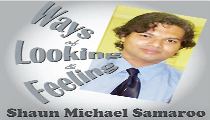Words we speak, write and design shape this land, our social space. Our most powerful tool comes from the words that flow in the society.
It is why literacy, education and sensible national leadership play such important roles in building this nation.
Citizens function within a linguistic environment. Our semantic space makes us who we are, shaping our thoughts, actions and community behaviour.

We model in our behaviour the words these people speak, write and design.
And when we look at and hear these leaders gathered in the National Assembly, we want them to perform in a way that would inspire us, motivate us, stir in our hearts the desire and passion to dream, to work hard, to believe, to strive with all our might for a great Guyanese nation.
Very few of these leaders seem to harbour such insight. In this tenth sitting, Speaker Raphael Trotman has come in for praise for his impartial leadership, his outstanding statesmanlike independence of thought, and his professional stance regarding the conduct of the House, including its environs outside the gates.
Minister of Education Priya Manickchand also seems to be reaching for a higher place, in a society that has lost its social graces long ago. We still have ladies and gentlemen among us.
And this is welcoming news, because upwards of 85 percent of skilled professionals continue to migrate.
But folks like Faith Harding, Manickchand, Trotman, and scores of others, show that we have capable, humble and dedicated leaders still among us.
Our best leaders strive against great odds to believe in the future of this land, having to manage widespread mediocrity, paucity of skills and poor communications capability.
We see all three reflected heavily in our national media. On TV, the internet, radio and in the daily newspapers, we see a lack of the kind of media landscape that would stir the hearts of citizens with the possibilities of a great Guyanese nation, with a new dream, with the belief that we could again be the breadbasket of the Caribbean, that our city could again be the Garden City of the Americas.
Of course the media organs merely reflect the society, and thus a mediocre, banal, drab society will show up in our media.
The Stabroek News seems to stand alone in trying its very best to practice professional journalism, with a strong semblance of balance, fairness and depth of thinking.
Other media operations either propagate shameless bias, or blatantly practice unprofessional standards and petty vendettas, much of it personal attacks.
Citizens consume the ideas, information and knowledge flowing to them from the national media establishment. And their lives reflect what the media portrays to them.
Citizens become moulded under the influential power of the national media. People model the behaviour they behold on their TV screens, read in the newspapers or listen to on the radio. The music scene is extremely lewd and vulgar, fuelling in the young a crass social ethic.
And then there is the new media, news on the internet, where lots of people now consume their information, form their ideas and shape their knowledge.
Even the online media landscape, this new national media, may be handicapped by the national skills deficit and lacks the kind of content and design that inspires its info consumers.
The popular free news sites online lack focused, detailed analysis of the society, and seem bent on sensationalist stuff. These sites concentrate on the “breaking news” sensation. Some also lack professional ethics, in broadcasting to the world crass gossip, biased propaganda and personal attacks.
Clearly, we face a desperate need to train most of our public commentators, writers, mass media designers and those indulging in the noble profession of Journalism. These folks seem to fail to realize that they shape the public mind.
It’s one thing to have the national leaders be poor speakers, writers or thinkers. It’s quite another to have a national media landscape that lacks the ability to mediate between the paucity of leadership we suffer from day to day in this society, and the passive citizens consuming information from unprofessional media workers.
We need to see the kind of content creation and design that makes a positive difference, and impact, on the psyche of the nation. Not only would this sustain a vibrant local media landscape, but it would serve the noble purpose of shaping a social space that is alive with good ideas, profound thought and excellence of conversation.
Marshall McLuhan, the Canadian thinker, noted in the 1980’s that the 21st century is a “mediated society”. The media establishment shapes and moulds us as a society.
The media’s influence on our leaders, to keep them accountable, professional and citizen-oriented in their goals and policies, is second to none. The media’s role is to act as a road map, a guide post, to make sure our leaders stay subjected to the ideal of the “consent of the governed”. That’s the media’s role in a democratic society.
The media self-governs and self-regulates, and it should remain this way. But it is necessary for our media operatives to take their work seriously, and to see their role as crucial in building the nation and shaping the social space of the society, and be careful with words.
Citizens would be uplifted and face each new day so much more alive and vibrant and inspired and motivated if they see newspapers, TV, radio and internet media of cutting-edge 21st century content and design, where excellence prevails as a deliberate strategy.
We must be careful that the words in the public square shape a social space that is dynamic and inspiring, with excellence of content and beauty of design.
This means developing a strategy and a plan of action to transform how we mediate our nation as a 21st century society of the digital-mediated global village.
It means that we realize that words, in their creation and design, embody power and influence over the minds and actions of men, women and children.




